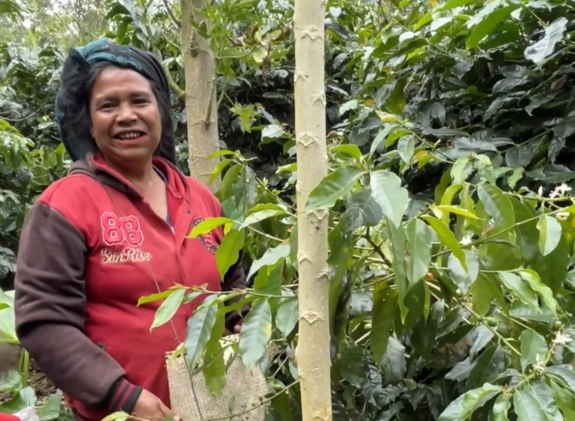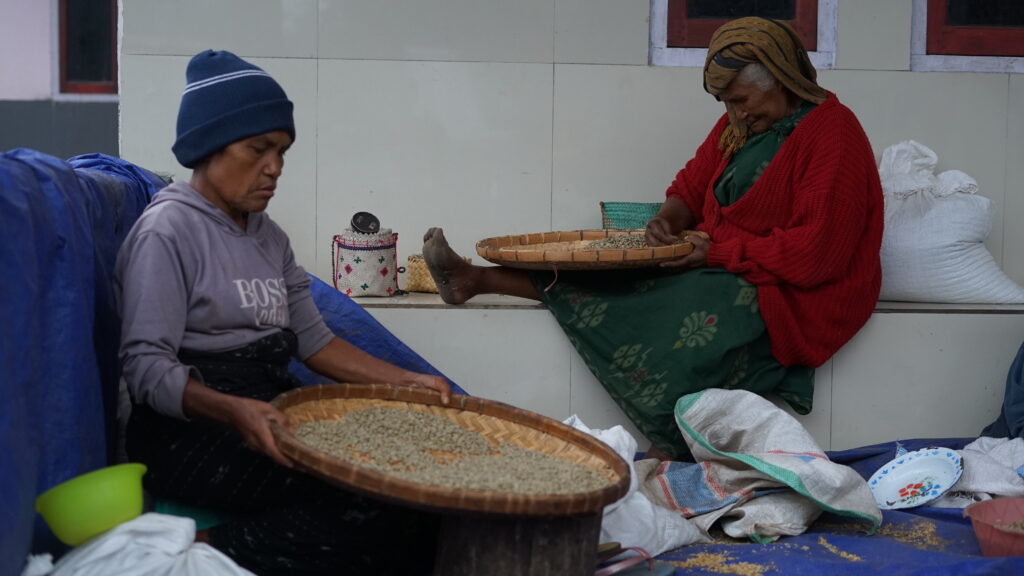
NOLA WONGA COFFEE

‘Lava to Java’
Sandwiched between mainland Indonesia and Australia lies a belt of volcanic islands. Amongst them is the famed Komodo National Park, with its majestic Komodo dragons. To its east sits the island of Flores in the East Nusa Tenggara, with the town of Bajawa located at its heart amongst the volcanic hills and lush forestland.
Strolling through the village of Wolo Wio, Bajawa, one encounters pig jaws hanging from wooden beams as symbols of prestige and prosperity, while stone monuments symbolising ancestral graves underscore the village’s deep-rooted animist beliefs and traditional practices. The traditional thatched-roof houses, elevated on stilts or sturdy plinths with striking sloped roofs, embody a design language intricately woven with the influences of the tropical environment and the area’s distinct cultural heritage.
Bajawa boasts natural hot springs and breathtaking volcanic landscapes, preserving an unspoiled essence of cultural richness and historical significance…it also grows exceptionally great coffee.
‘Bajawa is further east than anywhere else we source coffee from and feels distinctly different.’

Within Indonesia, Flores is famed for its Arabica; however, while Indonesia contributes to 5% of the world’s coffee exports, there has been a rapid decline in smaller coffee plantations like in Bajawa.
To understand this trajectory, we need to delve into some of the dark past of the region’s association with coffee.
While the coffee trade originated in the Arabian Peninsula, where its popularity and profitability resulted in traders wanting a monopoly on the market, the export of coffee seeds or plants was prohibited. However, in the late 1600’s a Dutch merchant and administrator of the VOC (the Dutch East India Company), Pieter van den Broecke, stole beans from a plantation in Mocha, Yemen and smuggled them out. They were then taken to Amsterdam to cultivate, where they failed to grow due to the inadequate climate conditions. The Dutch then reverted to the more genial climate of Indonesia, where the coffee crops thrived in this ideal climate that was rich in volcanic soils.
Indonesia was the first place outside of Ethiopia and the Arabian peninsula to cultivate coffee. It was hugely profitable for the VOC and the Dutch East Indies government in the 1800s — but unfortunately less so for the Indonesian farmer. The colonial government imposed the Cultuurstelsel in 1830, an unashamedly exploitative system that exchanged enforced coffee crops instead of taxes. It was abolished in 1870 but, combined with a bout of leaf rust disease that hit the region hard in the late 19th century, Arabica was replaced by the hardier Robusta coffee species. Now there are 1.24 million hectares of coffee plantations existing in Indonesia, out of which only 25% are dedicated to Arabica.

After Indonesia’s independence in 1945, Dutch-owned plantations were nationalised. But by then, many smaller plantations could not compete with larger mainstream operations and reverted to short-term cash crops, such as cabbages, cucumbers, and mustard greens.
Fast forward to 2014, when the Nola Wonga farmers group was created by Mr. Felix Soba to preserve the region’s heritage, with the return to cultivation of its renowned organic Arabica coffee.
He understood the challenges faced by the community and set about providing the farmers with financial support, distributing seedlings, and training them with much-needed skills. He encouraged the growth of coffee alongside their short-term crops, rather than as a replacement, thus reassuring the community of a low to medium-risk solution.
For the washed process coffee, cherries are hand-picked, collected in traditional woven baskets, and delivered to be pulped on-site within 24 hours of being harvested. The cherries are placed in water, floaters removed and then pulped and fermented in concrete tanks before washing. The drying process, on raised beds, takes up to 7 to 10 days.
Indochina Coffee had a first-hand experience of this process during our visit to Wolo Wio village in 2023, kindly facilitated by our export partner Mardianto of Mahana Coffee, Alfredo and Georgia of Sombra Coffee, Alfredo himself being a native of Bajawa. Getting to know the community, the people, and their culture and observing their processes was inspiring. We walked with the farmers through their coffee trees grown in-between rubber and other crops, that contribute to the biodiversity of the region. We spoke to a husband and wife team as they demonstrated the drying process, all while monitoring and turning the coffee beans at regular intervals.

Since its inception, the profits from coffee cultivation by Nola Wonga farmers group have increased exponentially, creating more demand and facilitating more job opportunities for the local community. It is also seeing a long-term positive impact on biodiversity and the productivity of their plantations.
It gives us great pleasure to introduce this unique and exceptional coffee to our customers, with its delicate tasting notes of elderflower, pomelo, and caramel. Nola Wonga is a great example of the diversity of Indonesian coffee, where meticulous processing is married with a commitment to preserving local coffee heritage.
Find out more on: https://indochinacoffee.com/coffee/indonesia-nola-wonga-2024/
